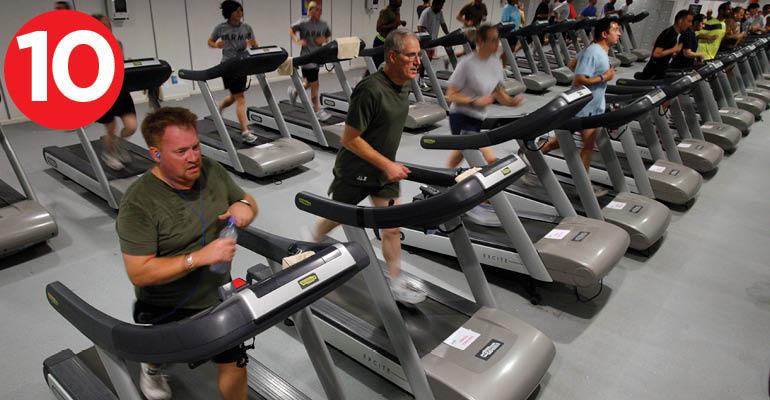- Saks Owner Joining Authentic Brands in Nearly $270 Million Bid for Barneys “Saks Fifth Avenue’s parent company has teamed up with Authentic Brands Group LLC on a nearly $270 million bid for Barneys New York Inc., said a person familiar with the matter. Under the offer, Saks, owned by Hudson’s Bay Co., would take over the bankrupt retailer’s website, launch Barneys departments in 41 of its stores and potentially take over some Barneys locations. A group of investors led by trade-show executive Sam Ben-Avraham had been pursuing a separate offer for Barneys worth roughly $220 million.” (Wall Street Journal, subscription required)
- The Top 10 College Towns in the U.S. in 2019 “Think college towns are just for rowdy undergrads? Think again. These energetic cities across the country are home to innovative small businesses, tons of fun activities, family-friendly annual events and thriving downtown scenes complete with arts, culture and delicious local cuisine. Plus, you’ll benefit from living and working near a college or university, where dedicated students and ingenious faculty members are conducting cutting-edge research and working to solve some of the world’s biggest problems — and their creativity and enthusiasm is contagious.” (MarketWatch)
- Crowded Out? “In 2014, Scott Whaley, president of the National Real Estate Investors Association in Cincinnati, told the Wall Street Journal that there was ‘massive demand, both from entrepreneurs who want to get access to capital, and from people who want to invest capital.’ But the field has thinned since those early days, and venture capital money has retreated from the space. Globally, venture capital for crowdfunding peaked in 2015 at about $76.4 million and plummeted to $25.7 million in 2017, according to real estate tech research firm CREtech. This year, it’s bounced back to $72.2 million year-to-date.” (The Real Deal)
- Towers in Earthquake Country—Designers Say the New Ones Are Safe to Their Core “For the people who design tall buildings — and the people who review those designs for seismic safety — there are two ways to measure the perceived safety of the towers that have transformed San Francisco’s skyline over the past decade. One is to run thousands of lightning-fast computer simulations that measure each set of design calculations. The other? Run the tests — and then go with your gut.” (San Francisco Chronicle)
- Aldi, Lidl Cut into U.S. Grocer’s Turf “German discount chains Aldi and Lidl are capturing a larger share of U.S. grocery bills and pressuring U.S. retailers to respond. The privately-owned foreign companies have increased sales with their simpler stores that offer fewer products at lower prices. In response, U.S. grocers are lowering prices on staples such as milk and eggs and adding more products the discounters aren’t known for, such as fresh foods. The battle comes as supermarkets already are fighting to keep customers from shopping more online.” (Wall Street Journal, subscription required)
- There Are 23% More Gyms in Shopping Centers Than There Were in 2010 “Traditional tenants in retail centers once scoffed at having gyms in their midst for all the parking spaces they took up. No more. JLL’s research team examined 6,000-plus fitness center move-ins dating back to 2013 and learned that 111,055 fitness centers currently reside in retail centers, an increase of 23.5% since 2010. It predicted continued growth of this segment to more than 120,000 locations by 2024.” (Chain Store Age)
- Hudson Yards Was Seen as a Model for the Mall of the Future. Here’s How It’s Going So Far “When the Hudson Yards megamall opened on the West Side of Manhattan roughly half a year ago, there were plenty of skeptics. And there still are. The development, a sprawling 1 million square feet of retail space, is in many ways supposed to be the new blueprint for a shopping mall in the twenty-first century and age of Amazon. There’s a floor dedicated to brands born on the internet, only one department store, plenty of restaurants, co-working space, interactive art exhibits lining the walls and room to lounge outdoors.” (CNBC)
- What Is Oyo? Behind SoftBank’s Latest High-Growth, High-Valuation Bet “This Softbank-backed company has a wild valuation. Sky-high growth. Potential to disrupt an entire industry. And no profits in sight. No, we're not talking about WeWork. Meet Oyo. The hotel startup—based in India—renovates existing buildings and upgrades services to meet a set of uniform standards that has made it a global leader in the hospitality market. And it doubled its valuation to $10 billion after the company announced last week it is raising $1.5 billion in capital to expand its presence in foreign markets, including the U.S. and the U.K, according to a company statement.” (Fortune)
- Frisco May Not Be the Fastest Growing City in the U.S., But It Ranked First in the Key Metric in 2019 “The suburb has been surpassed by others in recent years and is now among the top five fastest growing cities in 2019, according to the latest analysis from WalletHub. Frisco, however, is still outshining other cities in one key metric. The latest ranking from WalletHub’s study of 515 cities nationwide account for 17 different metrics including job growth, unemployment, poverty rate decrease and median household income growth. The personal finance website ranked cities using data that spanned 2010-2018 from a variety of sources including the U.S. Census Bureau, the Bureau of Labor statistics and the Bureau of Economic Analysis.” (Dallas Morning News)
- Triple Net Leases: What Real Estate Investors Need to Know “Lease structure is one of the most important concepts for real estate investors to understand. Most people are familiar with residential leases, but commercial properties are leased differently. The triple net lease is a popular lease type in commercial real estate, especially among single-tenant properties. Here’s an overview of the types of leases commercial tenants could potentially sign and what investors need to know about triple net leases.” (Motley Fool)
0 comments
Hide comments





